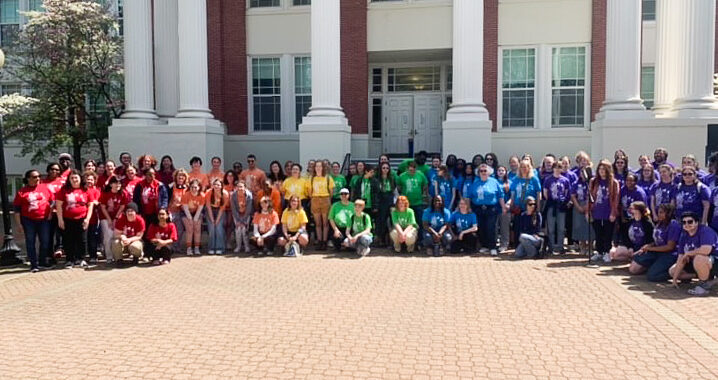Feminists protest outside President Hurley's home for greater awareness
4 min read
By EMILY HOLLINGSWORTH
Feminists United on Campus organized a protest last week near Brompton House, the home of University of Mary Washington President Richard Hurley, in an effort to reinforce their concerns and demand change to the university administration’s level of activity regarding sexual assault on campus.
Members of FUC held signs on Thursday, Oct. 30 that read “sexual assault is an epidemic” and “protect students.” FUC took photos and spoke to curious people passing by.
FUC’s protest came a week after the group participated in a rally with other student-led social justice groups called the “Make Noise Rally,” where students focused on bringing awareness to social issues and invited students to take action.
Thursday’s protest was meant to push two different actions: hiring a sexual assault response coordinator who would solely handle sexual assault cases on campus and organize prevention campaigns, and create a set budget that would go exclusively to sexual assault education, treatment and prevention on a yearly basis.
The desired Sexual Assault Response Coordinator would be in charge of all issues related to sexual assault and would assist victims. Contacting one office would make it easier for students to get help, according to Bailey Meeks, a junior creative writing and women and gender studies double major.
The responsibility of handling sexual assault cases and creating awareness and prevention programs at UMW currently comes from different offices on campus. The Talley Center for Counseling Services provides counseling and resources from students who are victims of sexual assault. Currently, Title IX Coordinator Leah Cox and Title IX Deputy Coordinator Raymond Tuttle investigate sexual assault cases and bring students involved in sexual assault cases to the Student Conduct Hearing Board.
Cox created the “Yes is the Key Campaign,” an initiative from UMW that began this semester and educates students on the importance of consent in relationships. Cox also oversees other campus-wide awareness programs.
In addition, UMW faculty and the Fredericksburg Police Department are trained to recognize instances of sexual assault and respond when a student reports a case.
Hiring a sexual assault response coordinator focused exclusively on sexual assault cases and prevention would be somewhat rare. Other secondary schools in Virginia, such as George Mason University and the University of Virginia have faculty that investigate sexual assault cases and organize consent education forms. However, those faculty members have additional responsibilities in the school. For instance, at UVa., the Title IX Coordinator Darlene Scott-Scurry is also the Director of the Office of Equal Opportunity Programs.
In addition to hiring a response coordinator, FUC also wants to create a set budget for sexual assault education and resources on campus.
The message written on their t-shirts read, “UMW spends more money protecting my e-mail than protecting my body.”
According to senior FUC secretary Sarah Palmer, the university contains a designated budget to keep student emails safe from being hacked, but do not have a specified budget for sexual assault education or cases on campus.
Hurley, in a statement regarding FUC’s protest, said he is “always proud of our students when they take a stand on an issue” and has “no problem with their protest.”
“The institution has focused on the issue of sexual assault in serious, meaningful ways, continues to focus on the issue to determine what we can do better and differently and certainly take the issue very seriously,” Hurley said.
Beginning Nov. 10, UMW will host a week-long program with activities that will educate students on the importance of consent, including the white ribbon campaign.
The University is also planning to participate in a state-wide survey with other universities in the Commonwealth to gather information about campus climate and use the survey to best decide what areas need additional support, according to a newsletter released from Hurley on Oct. 31.
With the same goal in mind to protect and educate students regarding sexual assault, five members of FUC attended a meeting with Cox and Doug Searcy, vice president for student affairs on Monday, Oct. 27 in order to discuss their concerns and to find a possible solution.
At the meeting, Cox, Searcy and the FUC representatives discussed the possibility of providing more involved discussions about the importance of consent at student orientations and working more closely with community organizations such as Rappahannock Council Against Sexual Assault and Mary Washington Hospital.
Palmer said Cox and Searcy were responsive to FUC’s ideas and felt the group’s concerns were addressed.
“It went pretty well,” Palmer said. “They were receptive to our ideas. Definitely felt we were getting heard.”
However, FUC wanted to continue the protest in order to show the administration that the goals they hope to achieve will not disappear anytime soon.
“We wanted to keep the pressure on the administration to show them that this is not an isolated incident,” Palmer said.











